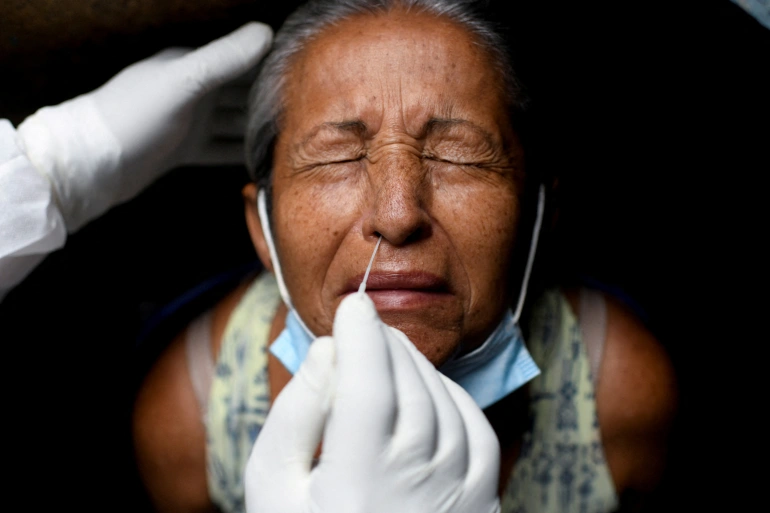Cases have doubled since last week, with experts warning of strains on the health systems and the economy.
ases, already suspected to be vastly undercounted, double in a week.
The surge has put strains on the country’s hospital system and is threatening the already lagging economy, but has been largely downplayed by President Jair Bolsonaro, who has been hostile towards restrictions and has spread misinformation about the virus since the pandemic began.
As of Thursday, confirmed cases nearly doubled compared with a week earlier, with the rolling average for the past seven days surging from more than 63,292 on the previous Thursday to 97,945, according to Johns Hopkins University data.
However, experts believed the actual number is much higher, due to a shortage of tests and unreliable systems for reporting and public disclosure of data.
Deaths, meanwhile, were at about 160 a day, far lower than in previous surges in the Latin American country, which regularly recorded more than 3,000 deaths a day in March of 2021. In total, more than 620,000 people have died in Brazil after contracting COVID-19.
Despite early indications that COVID-19 caused by the Omicron variant has milder symptoms than its predecessors, hospitals in the country have reported strains as staff have been infected and isolate after being exposed.
“If you don’t know a friend who’s got the virus at the moment, it means you don’t have any friends,” said Cesar Eduardo Fernandes, head of the Brazilian Medical Association (AMB), told the Reuters news agency.
“The situation is worrying and it is possible some services will collapse,” he said, adding that staff absences at hospitals had tripled in four weeks since the Omicron wave hit.
Meanwhile, the variant is also slamming the economy, with Brazil’s National Association of Restaurants saying 85 percent of its members are suffering staff absences, with about 20 percent of the total workforce out.
Airlines Azul SA and Latam Airlines Group were forced to cancel flights due to a shortage of staff, resulting in long queues in some airports.
This week, to alleviate the impact, the Ministry of Health reduced the quarantine period for asymptomatic COVID-19 patients to seven days, from 10.
Public health officials also hoped the country’s vaccination campaign, which has so far has seen 67 percent of the population get fully inoculated, will also help to alleviate pressures going forward.
Bolsonaro, for his part, has insisted that Brazil’s economy cannot afford another lockdown, and had instead defended the controversial approach of allowing people to get infected for so-called “herd immunity” against the virus to take root.
“Herd immunity is a reality. A person immunised with the virus has a lot more antibodies than a vaccinated person,” Bolsonaro said on Wednesday.
The president, who early in the pandemic dismissed the coronavirus as a “little flu”, even as it ravaged the country, also denied that Omicron had yet killed anyone Brazil, despite the state of Goias announcing the country’s first death due to the new variant.
“The person who died in Goias already had serious problems, notably with the lungs,” which is what killed them, Bolsonaro told the Gazeta Brazil.
His words earned a rebuke from the director of the World Health Organization’s emergency programme, Mike Ryan, who responded when asked about Bolsonaro’s comments from Geneva: “No virus that kills is welcome, especially if death and suffering can be avoided.”
Source: News Agencies

A healthcare worker takes a swab sample from a woman to be tested for COVID-19 at Princess Isabel Palace in Rio de Janeiro in Brazil [File: Lucas Landau/Reuters]

